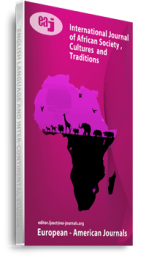Each generation, since the beginning of human existence, has sought to pass on cultural and social values, traditions, ethics, religion and skills to the next generation. The passing on of culture – enculturation and the learning of social values and behaviours -socialization replicate and reverberate human history together with the history of knowledge, beliefs, skills and cultures of humanity. In Africa tradition, music is an integral part of life linked with the worldview of the society in which it is produced. It has social, ritual, and ceremonial functions as well as some purely recreational purposes. Furthermore, quite a few African musical activities are ritualized and intended to link the visible world with the invisible. Traditional art forms, including music, are rooted in mythology, legend, and folklore which are associated with gods, ancestors and heroes. The values left behind by the forefather should not be meddled with and should be properly guided and monitored such that its relevance and values would be thoroughly employed as a means of improving the teaching of music education in African educational setting. Library search were used to source for information. This paper concludes that there is need for a paradigm shift to indigenous based curriculum for identity and uniqueness.
Keywords: Bequests, Indigenous knowledge, Music Education, Music in the Curriculum, Procedures to Teaching and Learning of Music Education., Traditional Music Education, Veracities

